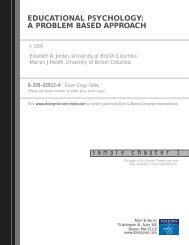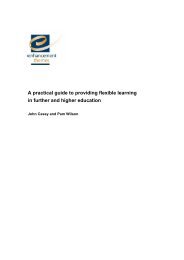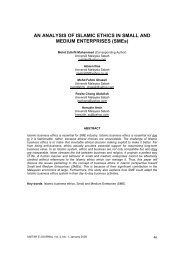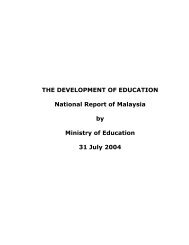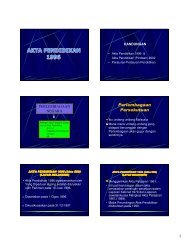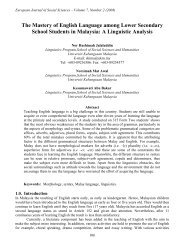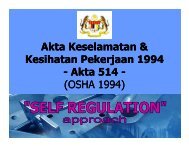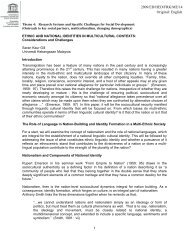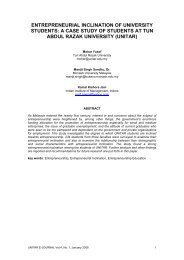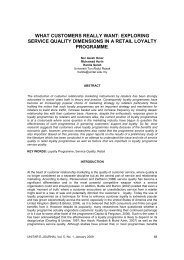Parent-community involvement in school ... - Teo-Education
Parent-community involvement in school ... - Teo-Education
Parent-community involvement in school ... - Teo-Education
Create successful ePaper yourself
Turn your PDF publications into a flip-book with our unique Google optimized e-Paper software.
104 Educ. Res. Rev.<br />
be given orientation to help them armed with <strong>in</strong>formation<br />
to be able to make a mean<strong>in</strong>gful contribution <strong>in</strong> the governance<br />
of <strong>school</strong>s (adm<strong>in</strong>istration, organization and management)<br />
The above case fits well <strong>in</strong>to the Botswana situation because<br />
as at now and as revealed by the study, most<br />
blames are heaped on the <strong>school</strong> adm<strong>in</strong>istrators for anyth<strong>in</strong>g<br />
negative that learners portray while at home.<br />
F<strong>in</strong>d<strong>in</strong>gs<br />
The <strong>in</strong>vestigation of the problem revealed both anticipated<br />
and unanticipated f<strong>in</strong>d<strong>in</strong>gs. Generally, from the literature<br />
consulted and data collected, what came out are the<br />
follow<strong>in</strong>g:<br />
There is a need for regular <strong>in</strong>teraction and communication<br />
among the stakeholders of the <strong>school</strong> <strong>community</strong> to<br />
be able to f<strong>in</strong>d solutions to problems together when they<br />
arise.<br />
The activities of the <strong>school</strong> are not the sole responsibility<br />
of teachers and the <strong>school</strong> adm<strong>in</strong>istrators alone. This<br />
is reflected <strong>in</strong> monitor<strong>in</strong>g learners after <strong>school</strong><br />
Batswana have been partially <strong>in</strong>volved <strong>in</strong> <strong>school</strong> activities<br />
despite the fact that most primary and secondary<br />
<strong>school</strong>s are <strong>community</strong> owned.<br />
There is general consensus that the <strong>school</strong> adm<strong>in</strong>istration<br />
should robe <strong>in</strong> the <strong>community</strong> <strong>in</strong> the year programme<br />
plann<strong>in</strong>g and copies of the planned activities made available<br />
to guide them so that they are able to know when<br />
they are required to make <strong>in</strong>puts to issues of mutual<br />
importance and welfare of the <strong>school</strong>, the learners and<br />
the <strong>community</strong>.<br />
There is agreement that monitor<strong>in</strong>g learners from several<br />
perspectives would make them become aware of their<br />
activities thereby mak<strong>in</strong>g them to behave responsibly<br />
wherever they would be.<br />
Teachers believe that parent-<strong>community</strong> <strong><strong>in</strong>volvement</strong><br />
would help them to improve <strong>in</strong> their effectiveness because<br />
they would be pull<strong>in</strong>g resources together for<br />
<strong>in</strong>stance when learners are given homework parents will<br />
make sure learners attend to it.<br />
Learners feel that the comb<strong>in</strong>ed efforts of parents,<br />
<strong>community</strong> and the <strong>school</strong> will make it possible for them<br />
to excel to be able to please their parents and teachers.<br />
It is necessary that teachers should go <strong>in</strong>to the <strong>community</strong><br />
with empathy and <strong>in</strong>teract mean<strong>in</strong>gfully with their<br />
constituents for mutual co-existence and progress.<br />
<strong>Parent</strong>s and the <strong>community</strong> should be called upon <strong>in</strong><br />
emergency situations outside the planned programme.<br />
<strong>Parent</strong>al and <strong>community</strong> <strong><strong>in</strong>volvement</strong> help to:<br />
(a). Improve discipl<strong>in</strong>e.<br />
(b). Punctuality of learners to <strong>school</strong>.<br />
(c). Make learners responsible and take their <strong>school</strong><br />
duties seriously.<br />
d). Make teachers feel confident that parents and <strong>community</strong><br />
are with them <strong>in</strong> whatever they do at <strong>school</strong> add-<br />
(<strong>in</strong>g to their confidence and effectiveness.<br />
Unanticipated f<strong>in</strong>d<strong>in</strong>gs<br />
The follow<strong>in</strong>g were the unanticipated f<strong>in</strong>d<strong>in</strong>gs which were<br />
considered relevant to be <strong>in</strong>cluded <strong>in</strong> the report.<br />
<strong>Parent</strong>s and the communities claim that they cannot take<br />
responsibility for someth<strong>in</strong>g that they have not been<br />
tra<strong>in</strong>ed to do. This <strong>in</strong>dicates that there is need for some<br />
education to orientate parents and the communities to be<br />
<strong>in</strong>volved <strong>in</strong> the management of the <strong>school</strong>s <strong>in</strong> their<br />
communities.<br />
<strong>Parent</strong>s and communities feel that they cannot he held<br />
accountable for responsibilities that they have no lawful<br />
control.<br />
Most members of the SGBs and PTA are either illiterate<br />
or semi-illiterate and for that matter cannot be expected<br />
to understand academic and management procedures<br />
of the <strong>school</strong>s <strong>in</strong> their communities.<br />
Recommendations<br />
The study has revealed very <strong>in</strong>terest<strong>in</strong>g and easy-to-follow<br />
results that have been presented <strong>in</strong> a very simple<br />
narrative for easy understand<strong>in</strong>g. The recommendations<br />
that are worth mak<strong>in</strong>g as a sum total of the study are that<br />
Members of the SGBs and PTAs should be literate and<br />
given adequate orientation about their responsibilities.<br />
Regular <strong>in</strong>teraction with all the stakeholders of the<br />
<strong>school</strong> government should be encouraged so that there is<br />
no redundant time lapse to contribute to the ferment of<br />
<strong>Parent</strong>-<strong>community</strong> should exist <strong>in</strong> tandem for progressive<br />
development and better performance for both teachers<br />
and their children.<br />
Implications for change<br />
In the process of br<strong>in</strong>g<strong>in</strong>g about progressive change <strong>in</strong><br />
society, there is always need for education. What is<br />
implied <strong>in</strong> this statement is that there should be regular<br />
<strong>in</strong>teractive education where the teachers and the parent<strong>community</strong><br />
group are <strong>in</strong>vited for brief<strong>in</strong>g about new developments<br />
<strong>in</strong> the <strong>school</strong> government system. Such education<br />
will go a long way to cement the cordial relationship<br />
that would be developed among the stakeholders for<br />
the effective and efficient runn<strong>in</strong>g of <strong>school</strong>s <strong>in</strong> Botswana<br />
communities.<br />
Conclusion<br />
From what have been sourced from the literature consulted,<br />
the <strong>in</strong>terview and questionnaire adm<strong>in</strong>istered it is<br />
pert<strong>in</strong>ent to <strong>in</strong>dicate that, all the stakeholders favour a<br />
k<strong>in</strong>d of partnership where every member of the partnership<br />
will participate effectively <strong>in</strong> the achievement of



